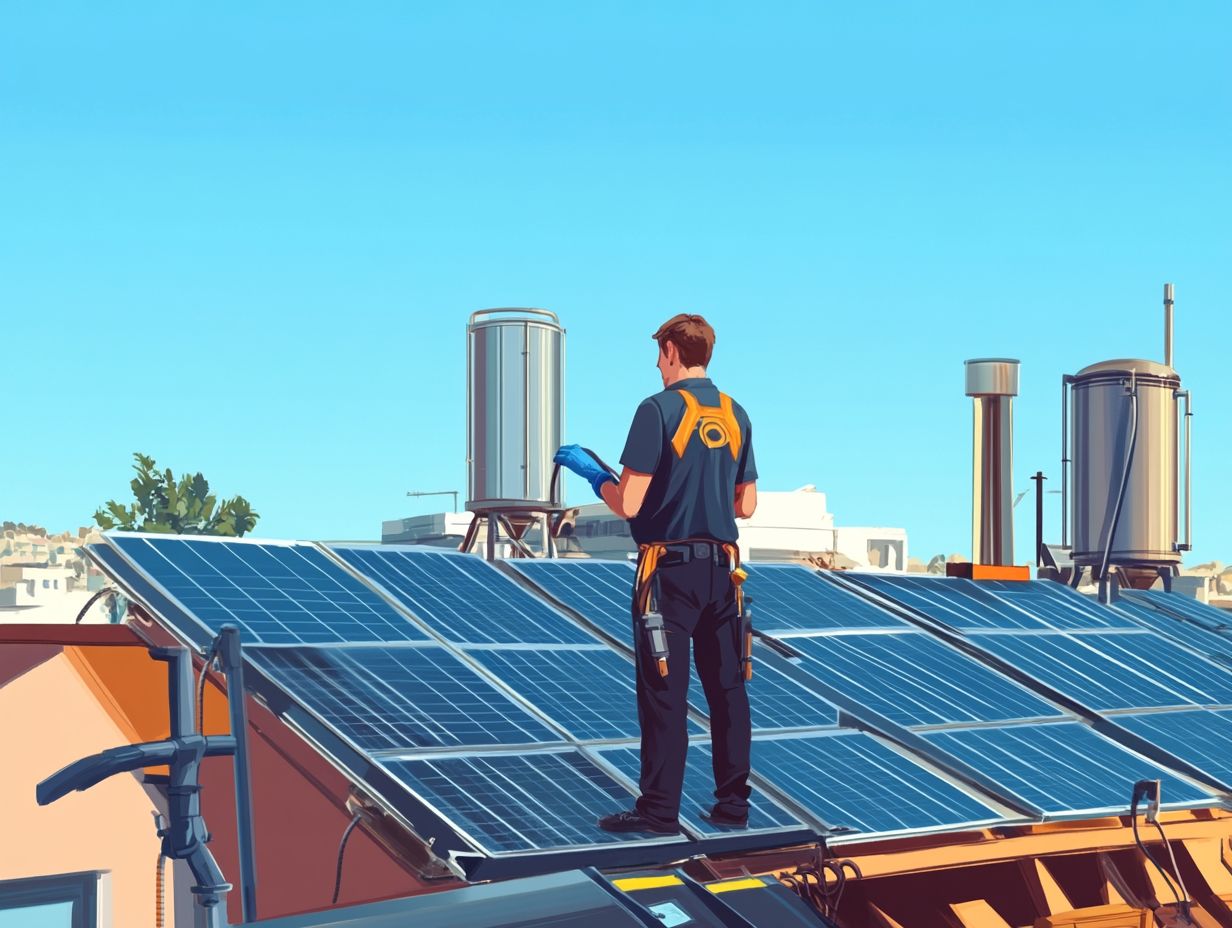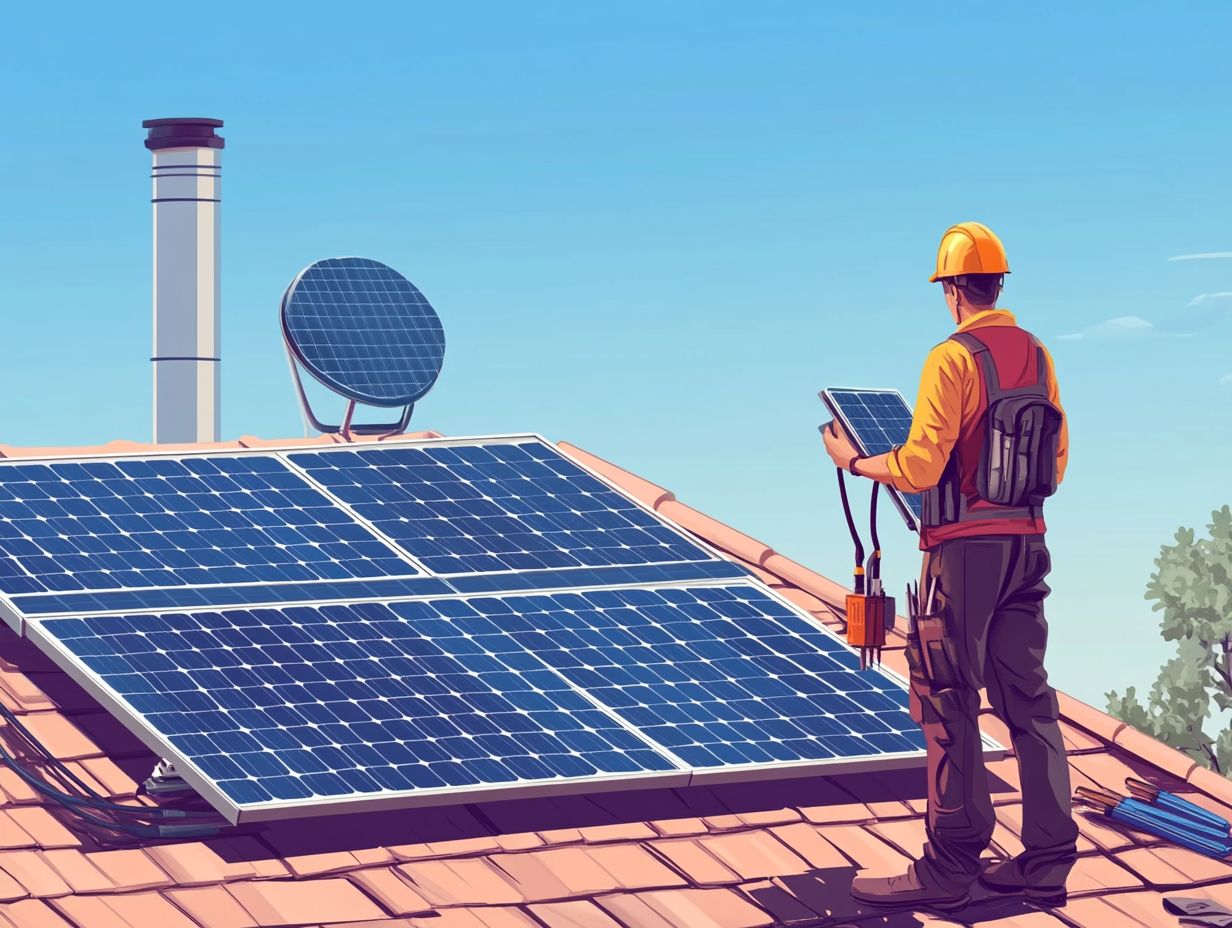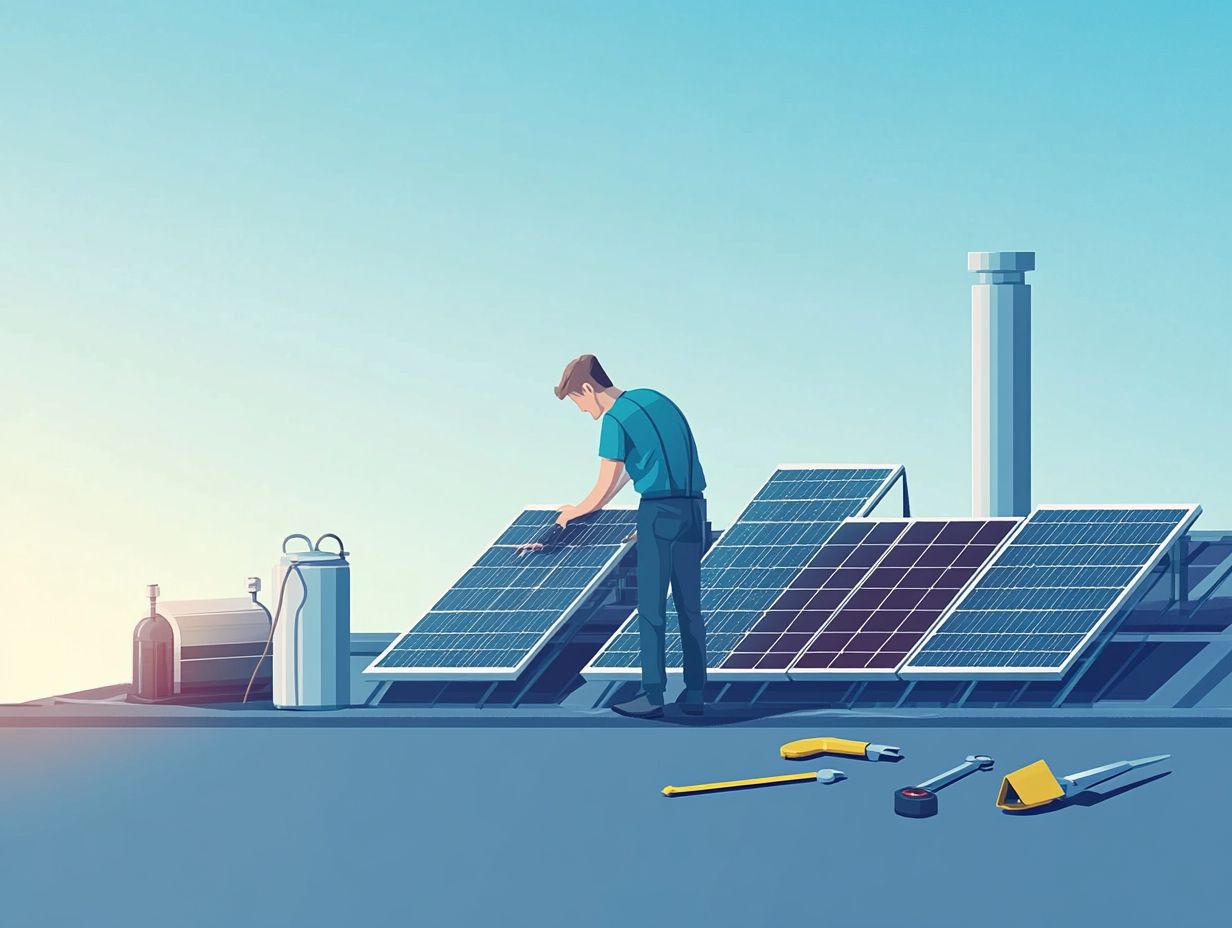Solar hot water systems provide an eco-friendly solution for harnessing solar energy to heat water, utilizing both solar glass panels and direct circulation systems; however, they do present certain challenges.
Homeowners may face common issues such as leaking panels, temperature regulation problems, and water heater leaks, which can adversely affect efficiency and overall performance.
This article addresses five prevalent issues, offers troubleshooting strategies, and outlines essential maintenance tips and maintenance inspections.
Readers will also discover the long-term savings and environmental advantages of transitioning to solar hot water systems. This information, along with understanding solar thermal repair and energy transference, will help ensure that solar systems operate smoothly and efficiently.
Key Takeaways:

1. Leaking or Damaged Solar Panels
Leaking or damaged solar panels represent critical issues that can significantly affect the efficiency of solar water heaters, resulting in inadequate hot water supply, increased energy costs, and potential damage to heat exchangers. Addressing these concerns promptly is essential for maintaining optimal performance in solar energy systems.
Common causes of leaks often originate from weather-related damage, such as extreme temperatures or heavy rainfall, which can degrade materials over time. Additionally, corrosion may develop due to prolonged exposure to moisture and environmental elements, further worsening the situation.
Early identification of such leaks is crucial; homeowners are advised to regularly inspect their systems for any signs of moisture or efficiency loss. Utilizing insulated storage tanks and incorporating water softening solutions can serve as proactive measures, helping to maintain temperature and reduce unnecessary stress on the system.
Furthermore, integrating monitoring devices allows for continuous oversight, notifying owners of potential water heater issues before they escalate into costly repairs.
2. Faulty or Damaged Pumps
A faulty or damaged circulation pump can impede the flow of heat energy in solar water heaters, leading to inefficiencies, temperature issues, and potential problems with natural convection that necessitate immediate diagnosis and repair for optimal system performance.
These pumps serve a vital function by ensuring that heated water circulates effectively between the solar collector and storage tanks, thereby maximizing energy extraction from sunlight. It’s important to be aware of 5 common misconceptions about solar hot water. Signs of pump failure may present as unusual noises, leaks, or a failure to start, and prompt attention to these symptoms is crucial to prevent further damage from scaling and sediment buildup.
To maintain continuous efficiency, the incorporation of performance monitors can be beneficial, providing real-time data regarding the pump’s operation and efficiency levels. Regular maintenance checks and troubleshooting, including the inspection of electrical connections and the replacement of worn components, are essential for sustaining operation and extending the pump’s lifespan, ultimately safeguarding the overall solar thermal system.
3. Issues with Temperature Regulation
Issues with temperature regulation in solar water heaters can lead to discomfort and inefficiencies, underscoring the importance of components such as the temperature relief valve and thermal regulator in ensuring a safe and effective hot water supply. These are crucial for managing the pressure system and preventing temperature problems.
These devices are critical for monitoring and controlling the water’s temperature to prevent overheating, which poses serious safety hazards. For example, the temperature relief valve automatically releases excess pressure or steam when the water reaches a certain temperature, effectively mitigating the risk of potential bursts. Concurrently, the thermal regulator actively adjusts water flow based on current heating conditions, thereby ensuring optimal performance.
Common issues, such as inconsistent water temperatures or slow heating, are often linked to these components. To address these concerns effectively, consider exploring the 5 essential questions about solar hot water systems. Regular maintenance, including visual inspections and professional servicing by a plumber, is essential for ensuring long-term reliability and comfort in hot water delivery.
4. Buildup of Sediment and Mineral Deposits

The buildup of sediment and mineral deposits in solar water heaters can significantly impact both efficiency and longevity. Therefore, regular maintenance inspections are critical to prevent scaling and ensure the optimal performance of the heating system, including the protection of the energy collector.
If sediment accumulation is left unchecked, it can lead to clogs that hinder water flow, resulting in reduced heat transfer and increased operational costs. Additionally, scaling within insulated storage tanks can exacerbate these issues by creating insulation barriers, which compel the system to work harder and potentially shorten its lifespan.
To mitigate these negative impacts, employing water softeners can aid in reducing mineral buildup. Committing to routine maintenance, such as flushing the system, inspecting components, and ensuring energy transference is optimized, is essential for maintaining high efficiency and extending the overall life of the equipment.
5. Inadequate Insulation
Inadequate insulation in solar water heating systems can lead to significant efficiency losses by allowing heat energy to escape. This not only increases energy costs but also accelerates corrosion in critical components, such as the water storage tank, which can suffer from thermal expansion issues.
Such inefficiencies affect the immediate performance of the system and may shorten its overall lifespan, resulting in costly repairs and replacements. Proper insulation techniques are essential for maintaining optimal temperatures within the tank, thereby minimizing the need for frequent reheating.
Utilizing high-quality insulated storage tanks contributes to reduced energy consumption and lower greenhouse gas emissions, benefiting both the environment and financial resources. Implementing comprehensive insulation strategies, including the use of heat conducting rods, ensures that the system operates at peak efficiency, providing reliable hot water while protecting vital components from wear and tear.
How to Troubleshoot and Fix Common Problems with Solar Hot Water Systems
Troubleshooting and resolving common issues with solar hot water systems requires a systematic approach. This includes identifying problems related to solar thermal repair, conducting maintenance inspections, and implementing a comprehensive maintenance plan to ensure long-term efficiency, reliability, and proper functioning of the solar thermal collector.
By expertly recognizing typical complications such as leaks, pump failures, and temperature regulation discrepancies, homeowners can effectively address these issues before they escalate. Regular inspections for signs of leaks around pipes and connections are crucial in preventing major water damage, excessive corrosion, and costly repairs. Additionally, considering 5 reasons to switch to solar hot water can also enhance your home’s efficiency.
Additionally, understanding how to properly diagnose pump issues whether stemming from electrical failures, air locks, or pressure system inconsistencies can lead to significant cost savings.
Maintaining the system within an optimal temperature range not only enhances efficiency but also extends the lifespan of the equipment. Emphasizing the importance of routine maintenance, such as flushing the system, checking fluid levels, and adding antifreeze when necessary, plays a vital role in preserving functionality.
Furthermore, knowing when to seek professional plumbing assistance for more complex issues can make a significant difference in overall system performance.
What Regular Maintenance Should Be Done for Solar Hot Water Systems?
Regular maintenance of solar hot water systems is essential for maintaining efficiency. This involves routine inspections of critical components such as the pressure relief valve, circulation pump, and solar monitoring devices to identify and address potential issues, such as those involving the heat exchanger, before they escalate.
These proactive checks encompass inspecting for leaks that could compromise the system’s integrity, as well as verifying that the monitoring devices function accurately to provide real-time data on system performance. Additionally, sediment buildup can impede heat transfer, making it crucial to flush the system regularly to ensure optimal functionality.
By prioritizing these maintenance tasks, homeowners can ensure that their solar hot water systems operate at peak performance. This commitment not only extends the lifespan of the equipment but also contributes to reducing long-term operational costs. For more detailed guidance, consider following these 5 steps to optimize your solar hot water system.
How Can One Prevent Common Problems with Solar Hot Water Systems?

Preventing common problems with solar hot water systems necessitates a proactive approach, which includes utilizing water softeners to reduce scaling, incorporating antifreeze in colder climates, and establishing a comprehensive maintenance plan that ensures regular monitoring and inspections, including checks for thermal expansion.
This strategy can significantly enhance the system’s efficiency and longevity. Homeowners should also contemplate professional installation, as proper setup minimizes risks associated with poor performance, such as sediment buildup, temperature fluctuations, and inefficiencies in the heating system. Additionally, following 5 essential maintenance tips for solar hot water systems can further ensure optimal performance.
Periodic evaluations, particularly before peak usage seasons, allow for timely adjustments and repairs, ensuring optimal system operation of the heating system. Simple measures, such as flushing the system to eliminate sediment buildup and inspecting insulation and solar monitoring devices, can contribute to smoother operations. For those considering enhancements, check out these 5 tips for solar hot water system upgrades to help prevent costly issues in the future.
What Are the Long-Term Savings of Using Solar Hot Water Systems?
The long-term savings associated with solar hot water systems are considerable, realized through reduced energy bills and lower maintenance costs due to efficient solar panels. These systems utilize solar energy to provide efficient and sustainable heating solutions using solar thermal collectors for residential applications.
Along with minimizing reliance on conventional energy sources like electricity and gas, which often come with fluctuating costs, these systems present homeowners with opportunities to benefit from various government incentives. When considering installation, it’s essential to know what to ask, so check out 5 questions to ask your solar hot water installer. Compared to traditional water heating methods, the financial advantages become evident; over time, users frequently experience significant reductions in their utility expenses.
With federal tax credits and local rebates available, the initial investment in solar technology and solar heater installation can yield a swift return, enabling users to recover their costs while making a positive contribution to the environment.
What Are the Environmental Benefits of Using Solar Hot Water Systems?
The environmental benefits of utilizing solar hot water systems and energy transference are substantial, offering sustainable heating solutions that significantly reduce carbon footprints and dependence on fossil fuels while leveraging the abundant energy provided by the sun and solar collectors.
By effectively capturing solar energy, these systems not only supply hot water but also play a critical role in reducing greenhouse gas emissions through efficient energy transference. However, it’s important to be aware of the 5 most common battery storage system problems as they replace traditional gas or electric water heaters, markedly decreasing the demand for energy sourced from harmful fossil fuels, thereby lowering overall emissions.
The widespread adoption of solar technology promotes a transition toward renewable resource utilization, demonstrating how contemporary energy solutions can transform approaches to climate change. However, it’s important to be aware of common issues with solar hot water systems. By incorporating these systems into daily practices, communities can actively contribute to a more sustainable future, fostering both ecological integrity and economic resilience.
How Do Solar Hot Water Systems Compare to Traditional Water Heating Methods?
Solar hot water systems present a compelling alternative to traditional water heating methods, demonstrating enhanced efficiency and long-
term cost-effectiveness by utilizing renewable solar energy and heat conducting rods rather than relying on electricity or natural gas-powered systems.
These systems effectively harness the sun’s energy, converting it into heat for domestic use, thereby reducing reliance on fossil fuels and diminishing greenhouse gas emissions. As consumers increasingly prioritize sustainability, a noticeable shift toward eco-friendly technologies and solar-powered heaters is occurring. This trend is reflected in the rising demand for renewable energy solutions, highlighting a broader commitment to minimizing environmental footprints.
By adopting solar hot water systems, households can significantly reduce their utility bills and mitigate water heater problems while contributing to a cleaner planet by using solar glass panels. For those considering this option, exploring the top 5 solar hot water systems for large families makes this choice not only practical but also a socially responsible decision.
Frequently Asked Questions

What are the 5 common problems with solar hot water systems?
The 5 common problems with solar hot water systems are low water pressure, airlocks, and efficiency losses, leaking pipes, failing sensors, and temperature problems, and buildup of sediment and debris in the tank.
How can I tell if my solar hot water system is experiencing low water pressure?
If the water flow from your taps, due to issues in the circulation pump or shower is weak, it could be a sign of low water pressure in your solar hot water system. You may also notice that it takes longer for the hot water to reach your taps.
What causes airlocks in solar hot water systems?
Airlocks in solar hot water systems can be caused by a number of factors, including faulty valves, incorrect installation, or a drop in water levels. They can also occur when the system is not used for an extended period of time.
What should I do if I notice a leak in my solar hot water system?
If you notice a leak in your solar hot water system, it is important to act quickly. Turn off the water supply and use a temperature relief valve and contact a professional plumber to inspect and repair the leak, addressing water heater leaks effectively. Delaying repairs can lead to further damage and higher costs.
Why are sensors important in solar hot water systems?
Sensors are an important component of solar hot water systems as they help to regulate and maintain the temperature, utilizing a thermal regulator of the water. If sensors fail, it can lead to issues such as over-heating or under-heating of the water, resulting in a less efficient system.
How often should I clean my solar hot water system to prevent buildup of sediment and debris with a water softening solution?
It is recommended to clean your solar hot water system at least once a year to prevent buildup of sediment and debris. This will help to maintain the efficiency of your system with a proper maintenance plan and prolong its lifespan.






